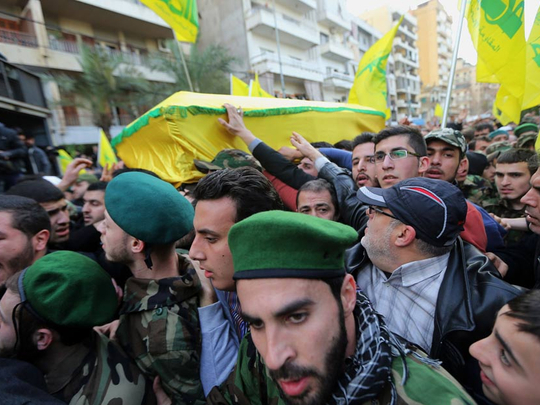
Beirut: Lebanon’s Hezbollah movement prepared on Monday to bury the son of its slain former military commander after an Israeli strike that killed six of its fighters and raised tensions between the longtime foes.
The raid, near Quneitra on the Syrian-controlled side of the Occupied Golan Heights, enraged the group’s supporters, but analysts said Hezbollah would seek to avoid a major escalation with the Israeli regime.
Once solely focused on fighting the Israeli regime, Hezbollah is now deeply involved in the war in neighbouring Syria, where it backs President Bashar Al Assad.
With its forces spread thin, and little appetite in fragile Lebanon for a new conflict with the Israeli regime, analysts said Hezbollah would have to find a way to respond without provoking a full-on war.
Hezbollah officials said Jihad Mughniyeh, son of the late Emad Mughniyeh, would be buried on Monday afternoon in Beirut’s southern suburbs, a stronghold of the militant group.
He is to be interred in the same grave as his father, who was killed in a 2008 car bombing that Hezbollah blamed on the Israeli regime.
Massive crowds were expected for the funeral.
The six fighters killed on Sunday afternoon were carrying out a field reconnaissance mission in Mazraat Amal village, Hezbollah’s Al Manar television said.
An Israeli security source confirmed that an Israeli helicopter had carried out the strike.
In addition to Mughniyeh, the strike killed Mohammad Eisa, a senior commander responsible for Hezbollah’s operations in Syria and Iraq, a source within the Shiite movement told AFP.
The raid raised tensions in Lebanon, with the army stepping up patrols along the so-called Blue Line, the UN-designated ceasefire line with Israel.
There was no immediate comment from Hezbollah officials, but the movement’s Al Manar channel branded the strike “a costly adventure that threatens the security of the Middle East”.
The raid came days after Hezbollah chief Hassan Nasrallah threatened to retaliate against the Israeli regime for its repeated strikes on targets in Syria.
Hezbollah says its intervention in the Syrian conflict helps the struggle against the Israeli regime because the Damascus regime forms part of a “resistance axis” alongside its main regional ally Tehran.
“The repeated bombings that struck several targets in Syria are a major violation, and we consider that any strike against Syria is a strike against the whole of the resistance axis,” Nasrallah said in an interview on Thursday.
He boasted that Hezbollah was “stronger that we ever were as a resistance movement” and touted its sophisticated arsenal, including Fateh-110 missiles.
The missiles have a range of 200 kilometres or more and are capable of hitting much of Israel.
The Israeli regime occupied parts of Lebanon for 22 years until 2000 and the two countries are still technically at war.
In 2006, the Israeli regime fought a bloody war against Hezbollah that killed more than 1,200 people in Lebanon, mostly civilians, and some 160 Israelis, mostly soldiers.












